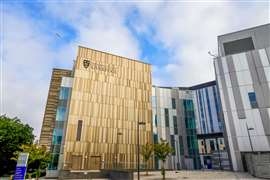Read this article in Français Deutsch Italiano Português Español
Digital twin tech reduces energy consumption by 23% in UK university study
10 April 2024
The University of Liverpool in the UK has successfully piloted a new project involving the creation of a digital twin building.
 The university’s facilities management team is said to be using the digital twin to continually monitor and improve the building’s performance (Photo: AdobeStock)
The university’s facilities management team is said to be using the digital twin to continually monitor and improve the building’s performance (Photo: AdobeStock)
The project has resulted in a 23% reduction in energy consumption and savings of £25,000 for one of the university’s campus buildings.
The technology, developed by Scotland-based climate technology firm IES, connected live operational data from the campus building to a digital twin building. This allowed the university’s facilities managers to evaluate the building’s performance in real-time and determine areas where efficiency could be improved.
The digital twin technology was able to assess the impact of ongoing heating, ventilation, and air conditioning work on the campus building. It also tested various refurbishment scenarios and identified those that would be most effective in generating energy, carbon, and cost savings.
Once the selected improvements had been made to the building, the digital twin was calibrated to match measured data on an hourly basis by connecting to live data from energy metres.
The university’s facilities management team is said to be using the digital twin to continually monitor and improve the building’s performance. The technology helps to prevent operational drift, whereby the performance of building systems degrades over time, by flagging any issues that can be fixed before they begin to have an impact.
IES said that the university can now track performance and gain improvement insights for energy, carbon, and comfort. The ongoing impact of the refurbishment can also be measured and verified. The university plans to continue collaborating with IES to create digital twins for three more buildings in the next phase of work.
IES associate director Valeria Ferrando said, “IES Live is a real game-changer, maximising the impact of a digital twin which leverages a world-class simulation engine and placing this power in the hands of those who need it.”
Tony Small, head of engineering services, University of Liverpool, added, “Working with IES on this project has given us detailed insight into the impact of our refurbishment work and will enable us to continually monitor and update our operational systems to ensure that the building is operating efficiently.”
Meanwhile, the University of Birmingham has announced plans to build a £50 million net zero carbon smart building, and will aim to significantly expand its energy research and education.
STAY CONNECTED


Receive the information you need when you need it through our world-leading magazines, newsletters and daily briefings.
CONNECT WITH THE TEAM










